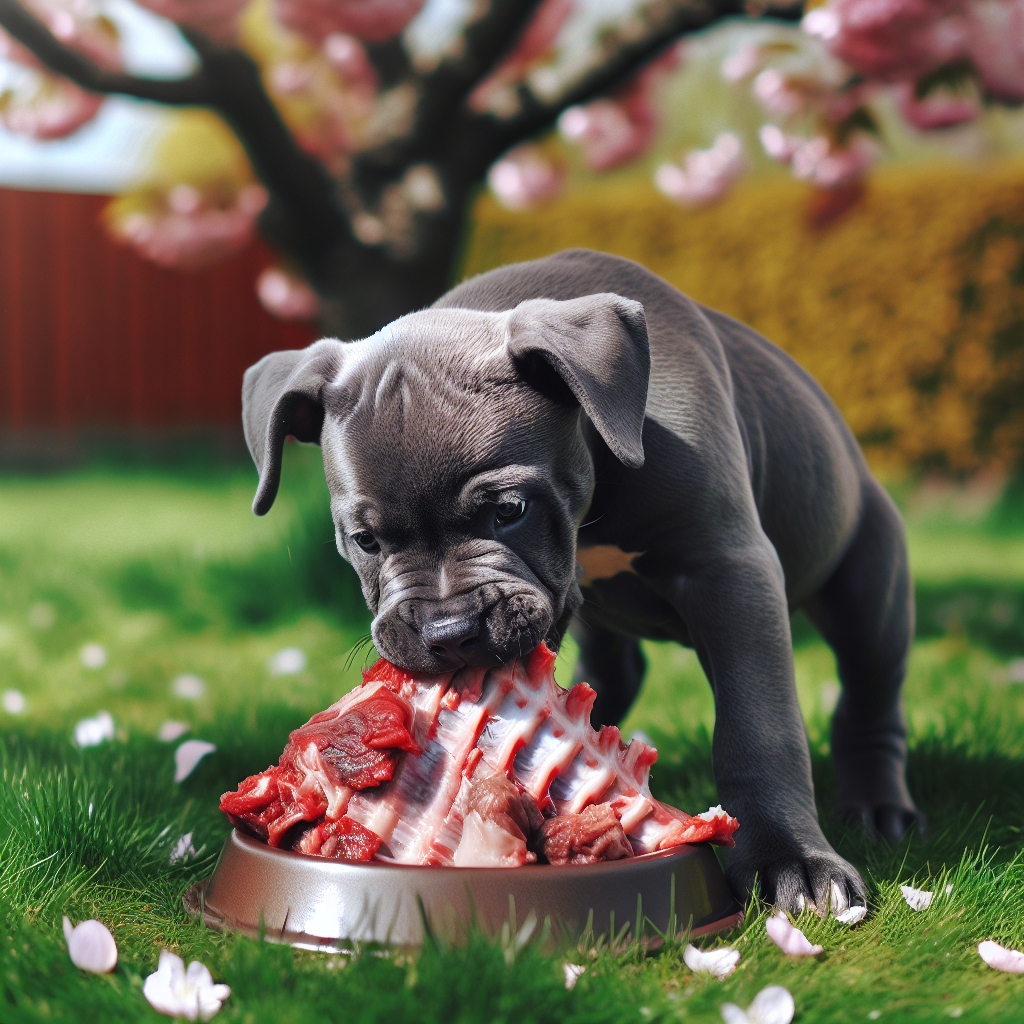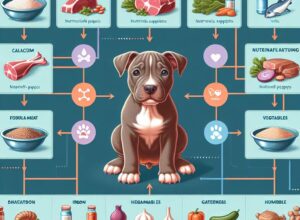
Key Takeaways
-
Understand the importance of a raw diet and its role in preventing worm infestations in pitbull puppies.
-
Learn to identify common types of worms that can affect pitbull puppies on a raw diet.
-
Recognize the early signs of worm infestation through physical and behavioral changes in your puppy.
-
Implement safe raw diet practices to minimize the risk of worms.
-
Discover how to bolster your pitbull puppy’s immune system to create an unwelcoming environment for worms.
The Raw Truth: Ensuring Your Pitbull Puppy’s Health
When it comes to your pitbull puppy’s diet, the word ‘raw’ can often spark a mix of curiosity and concern. But let’s get one thing straight: a well-planned raw diet can be a powerhouse of nutrition, giving your little champ all the building blocks they need for strong bones, a shiny coat, and a robust immune system. That said, a raw diet can also come with risks, and one of the biggest concerns is the threat of worms. But fear not! With the right knowledge and practices, you can keep those pesky parasites at bay.
Why a Raw Diet Matters for Your Puppy
A raw diet mimics what dogs would eat in the wild – think meat, bones, organs, and a small amount of vegetables and fruits. It’s all about natural, unprocessed foods. But why go raw? For starters, raw diets are packed with enzymes, vitamins, and nutrients in their most natural form. This means your pitbull puppy can absorb them better, leading to improved digestion, dental health, and overall vitality.
However, a raw diet can also attract unwanted guests – worms. These parasites love to hitch a ride on uncooked meats, which is why it’s crucial to source your ingredients carefully and handle them with hygiene in mind. But don’t let this deter you; with a few smart choices and precautions, you can provide your pup with a diet that’s both nutritious and safe.
Common Culprits: Types of Worms in Raw Diets
Before we dive into prevention, let’s talk about the enemy. The most common worms found in raw diets are:
-
Roundworms: These spaghetti-like parasites can cause a pot-bellied appearance and a dull coat.
-
Hookworms: Smaller than roundworms, but they can lead to anemia and lethargy due to their blood-sucking habits.
-
Tapeworms: Look for rice grain-like segments near your puppy’s rear end or in their stool.
-
Whipworms: These can be hard to detect but may cause diarrhea and weight loss.
Knowing what you’re up against is half the battle. Each type of worm has its own mode of transmission and health implications, so it’s essential to be vigilant about what goes into your puppy’s bowl.
Choosing the Right Ingredients
Let’s talk about what you’re putting in your pitbull puppy’s bowl. The foundation of a healthy raw diet is high-quality meat, but not all meats are created equal. You want to aim for human-grade meats whenever possible because they undergo more stringent inspections, which means a lower risk of parasites. Here’s what you should keep in mind:
-
Source from reputable suppliers who can guarantee the quality and handling of their products.
-
Opt for meats that have been frozen first, as freezing can kill many parasites.
-
Vary the proteins to ensure a well-rounded intake of nutrients – think beef, chicken, lamb, and fish.
Remember, the quality of the ingredients is not just about nutrition; it’s also about safety. Better quality often means less exposure to parasites that can lead to worms.
Hygiene in Food Handling
Hygiene is your best friend when it comes to preparing your pitbull puppy’s raw meals. Parasites thrive in environments where cleanliness is overlooked. So, roll up your sleeves and follow these steps:
-
Always wash your hands before and after handling raw meat.
-
Use separate cutting boards and utensils for raw meat to prevent cross-contamination.
-
Clean and disinfect all surfaces and bowls after meal prep – hot, soapy water is your ally here.
These simple habits can significantly reduce the risk of worm transmission, keeping your furry friend safe and healthy.
From Puppies to Protectors: Enhancing Immune Defense
A strong immune system is like a shield for your pitbull puppy, protecting them from the onslaught of parasites. A balanced raw diet plays a vital role in this, but there’s more you can do. Ensuring your puppy gets plenty of exercise and stays up-to-date with vaccinations will bolster their defenses. Besides that, let’s not forget the power of stress-free living. A happy puppy is a healthy puppy, so make sure they have plenty of playtime and love.
Another way to enhance your pitbull puppy’s immune system is by including foods that are natural immune boosters. Foods rich in antioxidants, like blueberries, or those with anti-inflammatory properties, like leafy greens, can give your puppy’s immune system that extra edge.
For example, adding a spoonful of pureed pumpkin to your puppy’s meal can aid in digestion and help flush out any unwelcome parasites. It’s a simple addition that can make a big difference.
By keeping your puppy’s immune system in tip-top shape, you’re setting up a strong defense against worms and other health issues.
Supplements That Support Your Pitbull’s Health
While a raw diet provides many of the nutrients your pitbull puppy needs, supplements can fill in any gaps and offer additional protection against worms. Here are a few to consider:
-
Probiotics: These beneficial bacteria support gut health, making it harder for worms to take hold.
-
Fish oil: Rich in omega-3 fatty acids, fish oil can boost immune function and improve coat health.
-
Diatomaceous earth: This natural, non-toxic powder can help eliminate internal parasites when used correctly.
Always consult with your vet before introducing any new supplements to your puppy’s diet to ensure they’re appropriate and dosed correctly.
Creating an Unwelcoming Environment for Worms
Preventing worms is all about making your pitbull puppy’s body a fortress that parasites just can’t breach. This means keeping their digestive system in prime condition. Regular deworming, as advised by your vet, is crucial. But there’s more to it than just medication. A diet that’s high in fiber and low in sugars creates a gut environment that’s less appealing to worms. Foods like carrots and apples (in moderation) can help scrub the intestines clean.
Remember, a healthy gut is less hospitable to worms, so focus on feeding foods that promote digestive health. It’s a simple strategy that can pay off big time in the health and happiness of your pitbull puppy.
Act Fast: Treating Worms in Pitbull Puppies
If you suspect your pitbull puppy has worms, it’s important to act fast. The longer worms are left untreated, the more harm they can cause. Look out for symptoms like a dull coat, weight loss, or changes in appetite. If you see anything amiss, it’s time for a trip to the vet. They can confirm the presence of worms and prescribe the right treatment.
When to Visit the Vet
Don’t wait if you notice any signs of worms or if you’re just not sure. The vet can perform a simple fecal exam to check for parasites. Most importantly, regular check-ups, even when your puppy seems fine, can catch worms before they become a problem. Think of it as preventative maintenance for your furry friend.
Medication vs. Natural Remedies
When it comes to treatment, you’ll find both medication and natural remedies on the table. Your vet might prescribe deworming medication, which is often the fastest and most reliable route. But for those interested in a more holistic approach, there are natural remedies to consider, such as garlic or pumpkin seeds. However, always discuss these options with your vet before trying them out. They can help you weigh the pros and cons and make sure you’re not putting your puppy at risk.
Ultimately, the best defense against worms in your pitbull puppy’s raw diet is a good offense: high-quality ingredients, impeccable hygiene, a strong immune system, and a vigilant eye for any signs of trouble. With these strategies in hand, you can enjoy the benefits of raw feeding while keeping those pesky parasites in check.
FAQs
How often should I check my Pitbull puppy for worms?
It’s wise to get into the habit of checking your Pitbull puppy for signs of worms every few weeks. Look for any changes in their stool, coat quality, or behavior that might suggest a worm infestation. Besides that, schedule regular fecal exams with your vet – at least twice a year – to catch any infestations early. Remember, the sooner you identify and treat worms, the better your puppy’s chances of a full and speedy recovery.
What raw ingredients are safest for my puppy?
The safest raw ingredients for your Pitbull puppy are those that come from reputable sources and have been handled with care. Here’s a quick checklist:
-
Human-grade meats, preferably from a trusted butcher or supplier.
-
Vegetables and fruits that are safe for dogs, such as carrots and blueberries, thoroughly washed.
-
Bones that are appropriate for your puppy’s size to prevent choking hazards.
Always avoid raw meats that you’re unsure about, especially if they haven’t been frozen first to kill potential parasites.
Can I combine raw feeding with dry kibble?
Yes, you can combine raw feeding with dry kibble, but it’s important to do it right to avoid digestive upset. Start by introducing raw food slowly, mixing it with the kibble and gradually increasing the raw portion over time. This gradual transition allows your puppy’s digestive system to adjust without overwhelming it. And, of course, ensure that both the raw food and kibble are high-quality and appropriate for your puppy’s nutritional needs.
What is the best way to transition my puppy to a raw diet?
Transitioning to a raw diet should be a gradual process. Start by replacing a small portion of your puppy’s current food with raw food, and slowly increase the raw portion over the course of several weeks. Pay close attention to how your puppy reacts to the new diet – any signs of digestive discomfort might mean you need to slow down the transition. It’s also a good idea to consult with a vet or a canine nutritionist to ensure you’re meeting all your puppy’s dietary needs.
Are there any specific supplements you recommend for a raw fed Pitbull puppy?
For a raw-fed Pitbull puppy, supplements can be a great way to ensure they’re getting a balanced diet. Here are a few I recommend:



